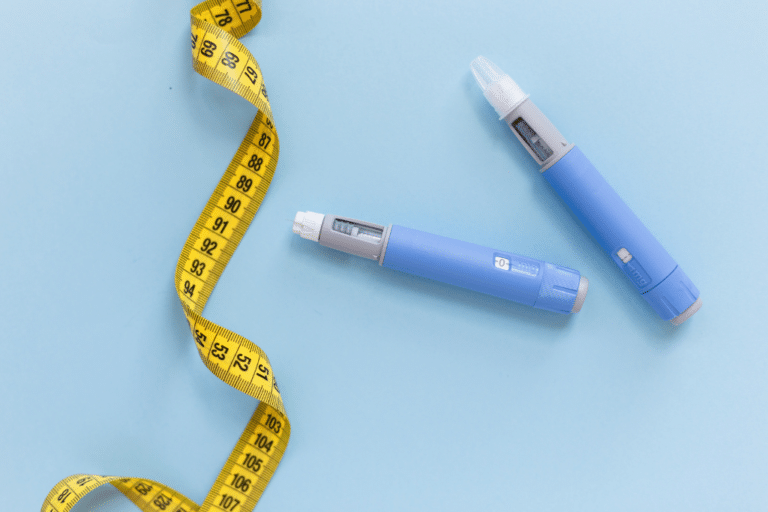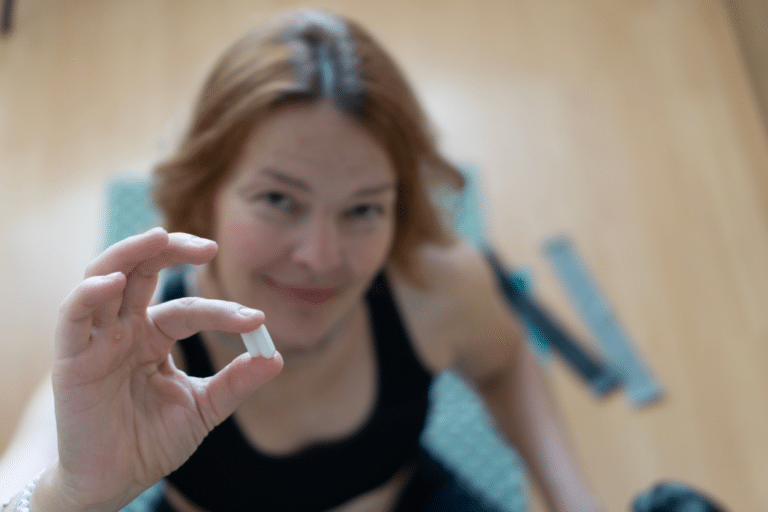GLP-1 receptor agonists like Ozempic, Wegovy, Mounjaro, and Zepbound are transforming how we approach weight loss, blood sugar control, and metabolic health. But if you’re using one of these medications, it’s essential to understand how they affect nutrient absorption and interact with both prescription and over-the-counter medications.
This guide will help you:
- Spot nutrient deficiencies early
- Avoid drug and supplement interactions
- Protect your long-term energy, mood, and muscle mass
How GLP-1 Agonists Work—and Why That Affects Digestion
GLP-1s work by mimicking a hormone that slows down how quickly food leaves your stomach. This helps you feel full longer and lowers blood sugar, but it also slows how other substances (like meds or nutrients) get absorbed. That means some things may not work as well, or may start building up in ways you don’t expect.
Common Drug Interactions with GLP-1s
Prescriptions to monitor include:
- Thyroid meds (like levothyroxine): delayed absorption = wonky labs
- Oral birth control: less reliable if not absorbed well (oops!)
- SSRIs/SNRIs: altered absorption can lead to mood changes
- Fat-soluble vitamins (A, D, E, K): need bile flow and good digestion
- Iron/B12: absorption requires stomach acid, which may be reduced
- PPIs (Prilosec, Nexium): when combined with GLP-1s, can severely limit nutrient uptake
Over-the-Counter Medications to Watch
Even common OTC meds can cause problems when combined with GLP-1s. Here’s what to look out for:
1. Proton Pump Inhibitors (PPIs)
- Example: Omeprazole, Nexium, Prevacid
- Block stomach acid, which further reduces absorption of B12, magnesium, iron, and calcium
- Can worsen fatigue, muscle cramps, or brain fog
✅ Ask your provider whether long-term use is still necessary and monitor your nutrient levels regularly.
2. Antacids
- Example: Tums, Rolaids
- Can interfere with mineral absorption if taken near supplements or GLP-1s
✅ Space 2 hours apart from other meds or supplements.
3. NSAIDs
- Example: Ibuprofen, Aleve
- Increase risk of GI bleeding or irritation, especially if nausea is already present on a GLP-1
✅ Use only as needed and avoid on an empty stomach.
4. Fiber or Laxatives
- Example: Metamucil, Miralax, magnesium citrate
- May help constipation but can also cause bloating or dependency
✅ Support motility naturally (hydration, movement).
5. Iron and Calcium Supplements
- Risk: poor absorption and potential GI side effects
✅ Choose well-absorbed forms and avoid taking with antacids or thyroid meds.
6. Sleep Aids
- Example: Benadryl, Unisom, melatonin
- May worsen grogginess if nutrients like magnesium or B12 are depleted
✅ Fix the root cause of poor sleep first—don’t just sedate the symptom.
Common Nutrient Deficiencies on GLP-1 Meds
Due to reduced intake and slowed digestion, you may become deficient in:
- Protein (key for muscle and metabolic health)
- Vitamin B12 (energy, cognition)
- Iron (oxygen transport, mood)
- Magnesium (nervous system, sleep, blood sugar)
- Vitamin D (immune, hormones, bones)
Symptoms to watch for:
Hair loss, fatigue, low motivation, weakness, poor recovery, sleep disruption, irritability.
How to Stay Healthy While Using GLP-1s
1. Test, Don’t Guess
Ask your provider for a comprehensive nutrient panel: B12, ferritin, folate, vitamin D, RBC magnesium, and RBC zinc. For a deeper dive, functional tests like the Organic Acids Test or Micronutrient Test can be game changers. Contact me for more info about these.
2. Prioritize Protein
Aim for 30g per meal to prevent muscle loss, even if you’re not hungry. Bone broth, Greek yogurt, ground turkey, lentils, or amino acid blends can help.
3. Upgrade Your Supplements
Methylated, bioavailable, and targeted.
4. Time Medications Wisely
Space out thyroid meds, PPIs, and antacids.
5. Support Digestion
Add enzymes or bitters if needed.
6. Work with a Provider
Your prescriber isn’t going to coach you through your treatment! Don’t go it alone. A well-trained practitioner can help you address root causes of weight gain or insulin resistance so you don’t stay on these meds forever—or suffer hidden side effects. These meds are powerful tools, not quick fixes.
Bottom Line
GLP-1s can be incredibly helpful—but only if used wisely. Ignoring nutrient depletion or drug interactions can leave you tired, foggy, and frustrated. With the right strategy, you can protect your health, energy, and hormones while getting the most out of your medication.
GLP does not stand for Good Luck, People! Need help optimizing your plan? I’ve got you. Let’s talk.
Dr. Anna Garrett is a menopause expert and Doctor of Pharmacy. She helps women who are struggling with symptoms of perimenopause and menopause find natural hormone balancing solutions so they can rock their mojo through midlife and beyond. Dr. Anna is the author of Perimenopause: The Savvy Sister’s Guide to Hormone Harmony. Order your copy at www.perimenopausebook.com.
Dr. Anna is available for 1-1 consultation. Find out more at www.drannagarrett.com/lets-talk




